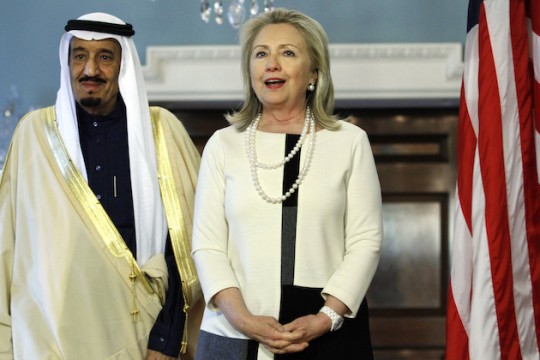The government of Saudi Arabia, one of the largest donors to the Clinton Foundation, has upheld the sentence of 1,000 lashes and 10 years imprisonment handed down against blogger Raif Badawi, who was convicted in 2012 of "insulting Islam through electronic channels." Badawi's crime was encouraging open debate on cultural and religious issues on his blog, the Liberal Saudi Network. The decision to uphold his sentence comes despite widespread international outcry:
Badawi received his first 50 lashes in January, but subsequent floggings have been postponed.
A shaky video taken on a mobile phone showed Badawi being lashed by a member of the security forces.
The footage prompted international protests which were repeated every Friday, the scheduled day for the beatings.
In March, the kingdom expressed "surprise and dismay" at international criticism over the punishment.
Badawi's family has warned he could die if the 1,000 are carried out in full. The Saudi government, meanwhile, has denounced what it sees as foreign efforts to influence its internal affairs.
The Saudi government and other related entities have donated between $11 million and $30 million to the Clinton Foundation. Bill Clinton, who attended Georgetown with Prince Turki bin Feisal, has long had ties to Saudi Arabia. His presidential library was financed in part by a $10 million gift from the Saudi royal family. Clinton recently hobnobbed with the prince at a lavish Clinton Foundation hosted by the King of Morocco.
A recent report in the International Business Times raised questions about whether Hillary Clinton had shown favoritism towards the Saudis during her tenure as Secretary of State. As an example, they cite her approval of an "enormous" shipment of advanced fighter jets worth nearly $30 billion:
Israeli officials were agitated, reportedly complaining to the Obama administration that this substantial enhancement to Saudi air power risked disrupting the region's fragile balance of power. The deal appeared to collide with the State Department’s documented concerns about the repressive policies of the Saudi royal family.
But now, in late 2011, Hillary Clinton’s State Department was formally clearing the sale, asserting that it was in the national interest. At a press conference in Washington to announce the department’s approval, an assistant secretary of state, Andrew Shapiro, declared that the deal had been "a top priority" for Clinton personally. Shapiro, a longtime aide to Clinton since her Senate days, added that the "U.S. Air Force and U.S. Army have excellent relationships in Saudi Arabia."
These were not the only relationships bridging leaders of the two nations. In the years before Hillary Clinton became secretary of state, the Kingdom of Saudi Arabia contributed at least $10 million to the Clinton Foundation, the philanthropic enterprise she has overseen with her husband, former president Bill Clinton. Just two months before the deal was finalized, Boeing -- the defense contractor that manufactures one of the fighter jets the Saudis were especially keen to acquire, the F-15 -- contributed $900,000 to the Clinton Foundation, according to a company press release.
In addition to being fans of the Clintons, Saudi Arabia is also quite fond of executions, and recently put out a hiring call for executioners to handle the rising number of beheadings and amputations.
